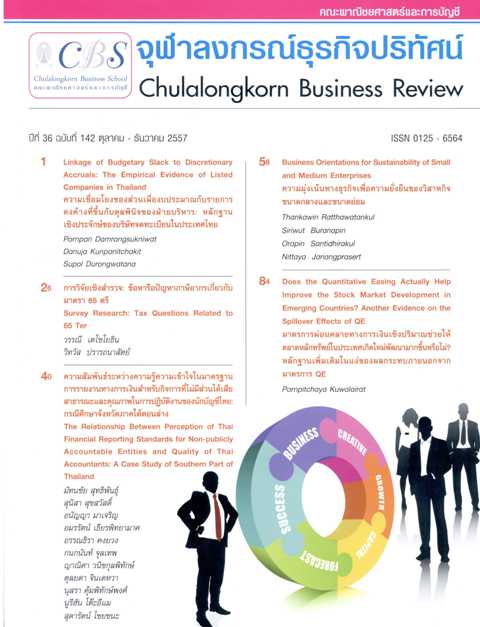Linkage of Budgetary Slack to Discretionary Accruals: The Empirical Evidence of Listed Companies in Thailand
Main Article Content
Abstract
บทคัดย่อ
งานวิจัยนี้ศึกษาความเชื่อมโยงของส่วนเผื่องบประมาณกับรายการคงค้างที่ขึ้นกับดุลพินิจของฝ่ายบริหารอันเป็นผลมาจากการบริหารกำไร โดยนี้ใช้ข้อมูลจากแบบสอบถาม และงบการเงินประจำปี พ.ศ. 2552 ของบริษัทจดทะเบียนในตลาดหลักทรัพย์แห่งประเทศไทยที่ไม่ใช่บริษัทในภาคการเงินและไม่ใช่บริษัทที่อยู่ระหว่างการฟื้นฟูกิจการ ผู้ตอบแบบสอบถามเป็นผู้บริหารระดับจัดการองค์กร จำนวนประชากรทั้งสิ้น 387 บริษัท และมีแบบสอบถามที่ได้รับการตอบกลับและใช้ได้จำนวน 38 ฉบับ อัตราการตอบกลับคิดเป็นร้อยละ 10 ผลการศึกษาพบว่า กิจการมีการบริหารกำไรผ่านรายการคงค้างที่ขึ้นกับดุลพินิจของฝ่ายบริหารและสร้างส่วนเผื่องบประมาณ โดยที่ค่าเฉลี่ยของรายการคงค้างที่ขึ้นกับดุลพินิจของฝ่ายบริหารมีความแตกต่างกันอย่างมีนัยสำคัญในแต่ละกลุ่มของกิจการ แต่ไม่พบความแตกต่างทางสถิติของค่าเฉลี่ยของส่วนเผื่องบประมาณในแต่ละกลุ่มของกิจการ ส่วนเผื่องบประมาณมีความเชื่อมโยงกับรายการคงค้างที่ขึ้นกับดุลพินิจของฝ่ายบริหาร คือกลุ่มกิจการที่สร้างส่วนเผื่องบประมาณและสามารถบรรลุผลสำเร็จตามงบประมาณแล้ว มีแนวโน้มจะเลือกบริหารกำไรให้ลดลงเพื่อต้องการสำรองกำไรส่วนเกินไว้ และ/หรือไม่ต้องการบรรลุผลสำเร็จตามงบประมาณมากเกินไปซึ่งจะมีผลต่อการกำหนดงบประมาณในงวดถัดไป
คำสำคัญ: ส่วนเผื่องบประมาณ; การบริหารกำไร; การบรรลุผลสำเร็จตามงบประมาณ; รายการคงค้างที่ขึ้นกับดุลพินิจของฝ่ายบริหาร
Abstract
This study investigates the linkage of budgetary slack to discretionary accruals as a result of earnings management. The study uses data from survey questionnaires and data from the annual financial statements for the year ended 2009 of listed non-financial and non-rehabilitation companies in Thailand. The respondents are those who are at the corporate level. The population covers 387 firms and there are 38 returned and usable questionnaires which is 10% response rate. The results reveal that firms choose to manipulate earnings through discretionary accruals and create slack into budgets. The means of discretionary accruals are significantly different among groups. However, there is no statistical evidence that the means of budgetary slack of each subsample group are different. There is a linkage of budgetary slack to discretionary accruals. Firms that incorporated slack into budgets and already achieved their annual earnings targets are more likely to manipulate earnings downward in order to reserve the excess earnings and/or not to exceed the targets by too much which will affect the budget setting in the next period.
Keywords: Budgetary Slack; Earnings Management; Budget Achievability; Discretionary Accruals.
Article Details
Opinions and discussions in papers published by the Creative Business and Sustainability Journal (CBSJ) are deemed as personal opinions and the responsibility of the writers. They are not the opinions or responsibility of the Chulalongkorn Business School of Chulalongkorn University.
Papers, content, information etc. appearing in the Journal are deemed to be the copyright property of the Chulalongkorn Business School of Chulalongkorn University. Anybody or any organization that wishes to publish any part of them or use them in any way must obtain written permission from the Chulalongkorn Business School, Chulalongkorn University.


